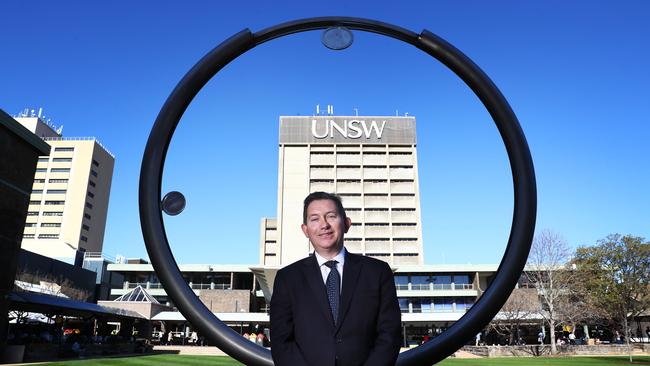Executive belt-tightening at universities as revenue dives
Two leading universities have revealed enormous revenue shortfalls this year because of the coronavirus pandemic.

Two leading universities have revealed enormous revenue shortfalls this year because of the coronavirus pandemic, and several vice-chancellors have taken salary reductions as the sector begins cutting costs and planning job losses to deal with the crisis.
University of NSW vice-chancellor Ian Jacobs told staff on Monday the university faced a projected shortfall of about $600m this year, or nearly one-quarter of its annual revenue. Professor Jacobs said he and his senior executives would cut their own salaries by 20 per cent as part of wide-ranging spending cuts.
“In recent weeks we have deferred all capital expenditure, frozen travel costs and directed senior leaders to impose significant discretionary budget cuts. We are also stopping or pausing recruitment,” he said.
But he said more action would be needed to deal with the budget problem and foreshadowed likely job losses following talks with the National Tertiary Education Union. The university had “encouraged them to join with UNSW in working together on creative solutions”, Professor Jacobs said.
READ MORE: Two key moves to save sector | Dreadful toll on students | Kiwis put us to shame | Uni fees should be higher | Unis miss out on $2bn JobKeeper support
The University of Queensland said on Tuesday that, at best, it would lose $240m in revenue this year, but the loss could be as much as double that figure depending on the length of the coronavirus restrictions and its impact on student numbers.
In an email to staff, UQ vice-chancellor Peter Hoj said that, in addition to falls in teaching revenue, the university was suffering revenue falls in other areas such as research and philanthropy.
He said the combined effect of savings measures announced in February and further “adjustments” now would save more than $100m this year. He said the university had deferred $120m in capital spending.
Professor Hoj also said in the email that he had increased his contribution to the university’s student emergency support fund to 20 per cent of his salary.
Last Friday La Trobe University said it faced a revenue of between $120m to $150m this year, from budgeted revenue of $850m.
Vice-chancellor John Dewar said: “While the impacts at La Trobe may not be as severe as some other Australian universities, we will soon be facing a simple choice: ‘share the pain’ across the organisation’s staff or implement a significant cost-cutting exercise.”
Professor Dewar said he and his senior executive team had volunteered to take a 20 per cent pay cut in the pay period from April 25 to July 3 and the cut would be continued beyond that if required.
University of Western Australia vice-chancellor Jane den Hollander said all members of her university’s executive had taken a 20 per cent pay cut. And Charles Sturt University vice-chancellor Andrew Vann is forgoing his annual bonus and plans to cut his base salary by 10 per cent.
The huge revenue falls are driven by enormous declines in international student numbers that began in February when Chinese students were blocked by a travel ban from coming directly to Australia, culminating in the situation in which international students, like all non-citizen foreign residents, cannot enter Australia.
However, one bright spot for universities is that domestic student numbers appear to be remaining strong, even though students have to contend with studying online at home using hastily developed online learning protocols.
The final number of domestic students will not be clear until all universities have passed their census dates, but so far it appears there will not be a significant fall in student numbers that would result in lower funding grants from the federal government.
Because of the pandemic the federal government also is expected to ease performance-based funding rules for this year that would have judged universities on a range of measures, including graduate job outcomes, and divided a pot of about $80m according to their performance. On Wednesday federal parliament will vote on legislation for the $130bn JobKeeper program which, in one of its provisions, will give registered charities easier access to the job subsidy scheme.
However, even though universities are charities registered with the Australian Charities and Not-for-profits Commission, the government plans to block them from using JobKeeper on the same basis as other charities.
It will use a legislative mechanism that will allow Treasurer Josh Frydenberg to use discretionary powers on the matter.




To join the conversation, please log in. Don't have an account? Register
Join the conversation, you are commenting as Logout